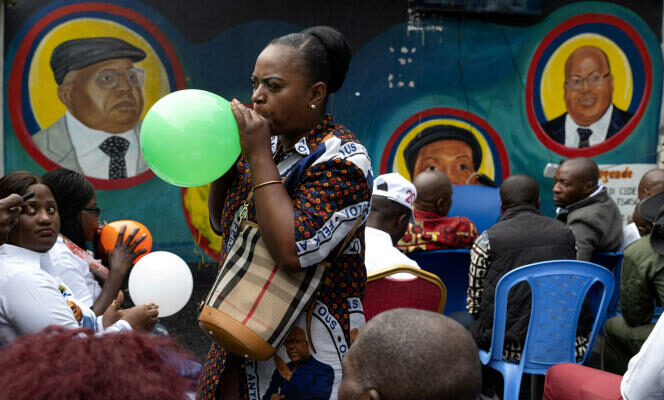It took almost a month, after the vote on December 20, 2023, for the outcome of the legislative elections to be known in the Democratic Republic of Congo (DRC). While the results of the presidential election, which confirmed the victory of the outgoing president, Félix Tshisekedi, were given on December 31, those of the legislative elections, which were held at the same time, were only announced on the night of Saturday January 13 to Sunday January 14.
Initially scheduled for January 3, the announcement ceremony was postponed sine die by the Independent National Electoral Commission (CENI). For two weeks, contradictory dates circulated on social networks, reflecting the impatience of 40 million voters and 23,000 candidates.
The president of the CENI, Denis Kadima, finally settled at the Bosolo electoral center, in Kinshasa, to go through the list of elected officials for an hour and a half, candidate by candidate. Unsurprisingly, the presidential party, the Union for Democracy and Progress (UDPS), comes first with 69 of the 477 seats allocated out of the 500 in the National Assembly. The remaining 23 correspond to constituencies where voting could not take place due to insecurity, notably in the territories of Masisi, Rutshuru and Kwamouth.
“Unofficial negotiations”
But the party of Félix Tshisekedi, freshly re-elected with more than 73% of the votes for a second term, does not have a majority on its own. “Including if we add all the other satellite parties of the UDPS”, analyzes Ithiel Batumike, researcher at Ebuteli, a Congolese research institute on politics and security. The Action of the Allies and Union for the Congolese Nation (A/A-UNC), of Vital Kamerhe, the Minister of Economy, or the Movement for the Liberation of Congo (MLC), of Jean-Pierre Bemba, the Minister of defense, could make the difference. The two big names joined the presidential majority during Félix Tshisekedi’s first term.
For now, only Together for the Republic could become the main opposition force in the country, for the first time in the history of this young party created in 2019. The movement of Moïse Katumbi, who came second in the presidential election with 18% of the votes, obtained around twenty seats and ranked ninth out of 71 parties candidate for the legislative elections. A little less than half of them did not reach the necessary voting threshold (1%) and will not have representatives. Among them, the Alliance of Congolese for the Refoundation of the Nation (ACRN), of Nobel Peace Prize winner Denis Mukwege.
How many parties will Félix Tshisekedi have to form an alliance with to reach the majority and thus appoint his future government? Negotiations with the 44 political parties now represented in the National Assembly began well before the announcement of the results. “Unofficial negotiations count more than votes”, deplores a former member of the majority who wishes to remain anonymous. This elected official was not re-elected but claims to have won in his stronghold. “The figures announced are only the result of deals between moral authorities”he continues, denouncing “nominations rather than elections”.
In the past, some of the rewards offered to MPs in exchange for their allegiance had caused controversy. In 2021, the authorities had indeed offered Jeeps to elected officials who had joined the Sacred Union. At the time, the UDPS was in much worse shape. The Common Front for Congo (FCC), the coalition of former President Joseph Kabila, had obtained the majority of seats, forcing the new head of state to govern in a form of cohabitation for two years. This time, nothing like that. Joseph Kabila’s party, with a significant territorial base, and the supporters of Martin Fayulu, who came third in the presidential election, boycotted the legislative elections.
Suspicions of fraud
“While we were campaigning on the ground, the others were preparing the voting machines to cheat”, reacted Sunday Josué Musa Toto, unsuccessful ACRN candidate in Bukavu, in the east of the country, and close to Denis Mukwege. Irregularities proven by the CENI led, on January 6, to the cancellation of 82 candidacies due to fraud, corruption, violence and detention of electoral equipment.
Three ministers in office – Didier Mazenga, Minister of Tourism, Nana Manuanina, Minister Delegate to the president of the Republic, and Antoinette Kipulu, minister of professional training – and four provincial governors are concerned. At the top of the list is Kinshasa Governor Gentiny Ngobila, whose immunity was lifted on January 9 after prosecutions were initiated by the attorney general. Other personalities, such as senators and deputies, were also singled out.
Follow us on WhatsApp
Stay informed
Receive the essential African news on WhatsApp with the “Monde Afrique” channel
Join
These suspicions of fraud could explain the delay taken by the CENI. The compilation of both paper (obtained with ballots) and electronic (obtained from voting machines) results also took time, the institution officially assures. “But this double compilation was not made, observed Ithiel Batumike, from the Ebuteli Institute. Only electronic votes were counted. »
